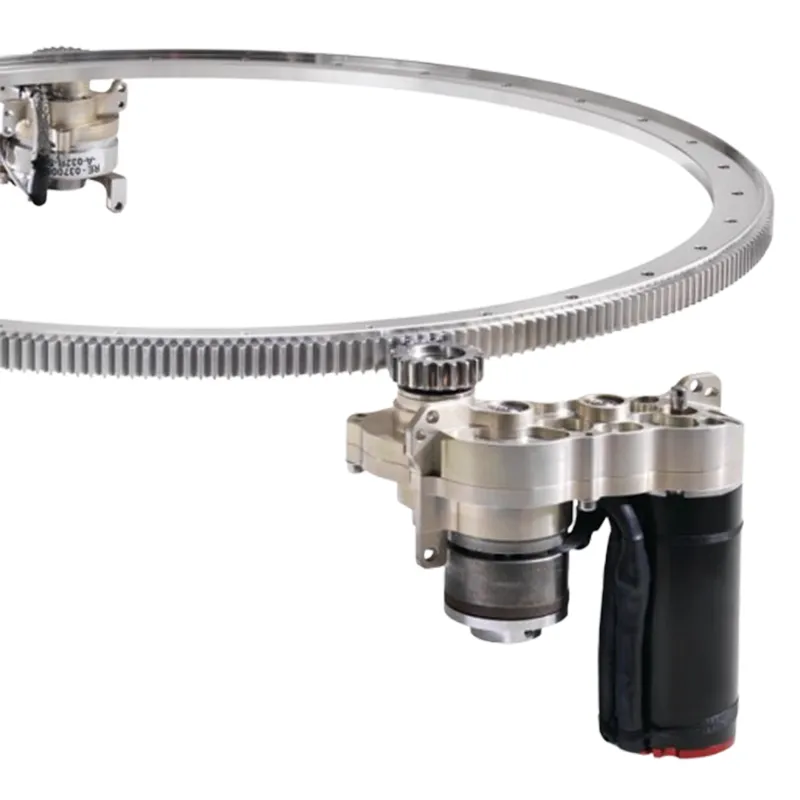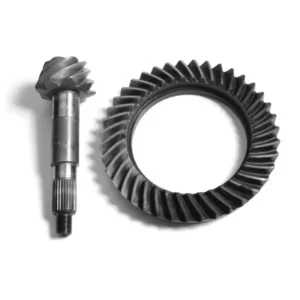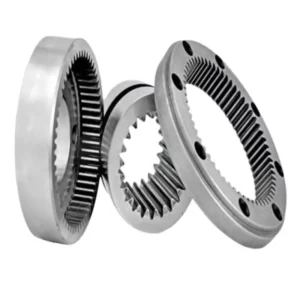A ring gear designed for aerospace and satellite applications is a precision-engineered internal gear, typically featuring an involute tooth profile on the inner surface of a lightweight, durable cylindrical ring. It plays a critical role in planetary gear systems, providing high torque and reliable power transmission within the stringent size and weight constraints of aerospace environments. Crafted from advanced materials like titanium or high-strength alloys, it ensures exceptional strength-to-weight ratio and resistance to extreme temperatures and vibrations. This gear enables smooth, efficient meshing with planet gears, supporting critical functions such as satellite positioning mechanisms or aircraft actuation systems, where accuracy and dependability are paramount.
Ring Gear Specifications
| Use | Ring Gears are frequently used in aerospace and satellite applications or in any situation where it is necessary to convert torque. |
| No. of Teeth | Up to 197 teeth are available |
| Pressure Angle | 14, 20 & 25 Degree Pressure Angle is available |
| Thickness | Open up to 1.” |
| DP – Diametral Pitch | Up to 250+ DP |
| Inside Diameter | Open up to 48.” |
| Outside Diameter | Available from 0.05″ to 30″ in gear outer diameter |
| Quality Control | Conforming to general Military Quality control requirements as follows: MIL-I-45208A, MIL-STD-45662A, ISO 9001:2000 compliant, and ISO 13485 Medical Device Certification is pending. |
| Applications | We focus on providing ring gears to the satellite, military, and aerospace industries. |
| Quantities | 10+ |
| Lead Time | The average lead time on ring gears orders is four weeks |
| Preferred Drawing Formats | We prefer to accept CAD files of your designs in DXF format. |
Capabilities
| Industries | Aerospace Gears Defense Gears Government Gears Industrial GearsInstrumentation Gears Medical Device Gears Military Gears Oil & Gas Gears |
| Materials | Steel 303 Stainless Steel 17-4 Stainless Steel 440 Heat Treated Stainless Steel Carbon Steel Chromium Stainless Steel Chromium Steel Chromium-Molybdenum Steel Chromium-Molybdenum-Vanadium Steel Chromium-Vanadium steel High Strength Steel (Impact™, MicroTec®, WHS-100™) High-Temperature Steel Manganese SteelMolybdenum Steel Nickel-Chromium Steel Nickel-Chromium-Molybdenum Steel Nickel-Molybdenum Steel Silicon-Manganese Steel Special Bearing Steel Aluminum Cast Iron Bronze Plastic AVEC Nylon Delrin |
| Standards | Able to meet AGMA quality level 12 for all gears (Precision 3), ANSI/AGMA 2001. Medical Device Gears, Custom Aerospace Gears, Custom Robotics Gears, Custom Gear Supplier. |
Features of Ring Gear
A ring gear, often an internal gear, features teeth cut on the inner surface of a cylindrical ring, typically following an involute profile for smooth and efficient meshing with external gears like planet gears in a planetary system. This design ensures a constant angular velocity ratio and effective load distribution across the teeth, enhancing durability and performance. Its internal orientation allows it to encircle mating gears, providing a unique combination of compactness and strength suitable for various mechanical systems.
The ring gear’s large diameter and concave tooth geometry enable high torque transmission and substantial gear reduction ratios, making it a critical component in applications requiring power in confined spaces. It rotates in the same direction as its mating gears, simplifying motion dynamics in systems like planetary drives. Often manufactured with a profile shift to avoid interference and bolster tooth strength, it excels in high-load scenarios, from automotive differentials to industrial machinery.
Crafting a ring gear typically involves gear shaping rather than hobbing due to its internal structure, demanding precision to maintain tight tolerances and prevent meshing issues. Materials range from steel for general use to lightweight alloys for specialized applications, balancing strength and weight. Its versatility, reliability, and ability to handle complex load conditions make it indispensable across industries, including aerospace, automotive, and robotics.




